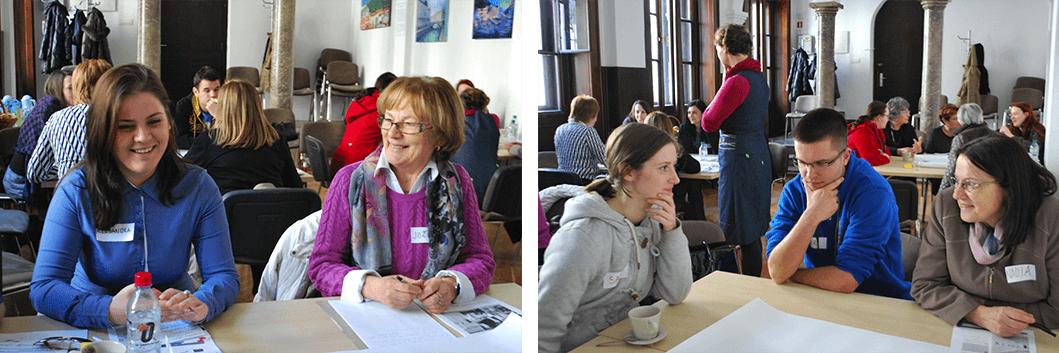Generations
Generations
Centres Each-One-Teach-One

“It is often believed that older people are interested only in their tiny personal issues, that young people are not committed. That is far from being true!”
About intergenerational ties
Family is a natural intergenerational community, but family has been constantly changing together with the changing society since 1960. Even the old definition of family “community of adults characterised by common residence, economic cooperation and raising children” does not fit anymore.
Today there is a strong need to support both family and social intergenerational ties and bonds. There are several ways to do it, intergenerational policy, projects, practices and centres being just some of them.
In different setting intergenerational education and learning developed from older adult education all of them being primarily meant to support social ties and transformation. This being a long process, a compilation of short educational and learning events does not seem to be the solution of choice.
Intergenerational activities
The role of Slovenian Third Age University has been both to conceptualise intergenerational education and learning and to create permanent settings where they can take place (each- One-Teach-One centres).
Slovenian Third Age University itself started as an intergenerational project where knowledge and skills were revived and new knowledge and skills were constructed together by all the participants. Young students of adult education sciences started study circles together with retired professionals. They all got involved in common learning and organisational activities. They also got involved in common activities for the benefit of local community. Many members of Slovenian Third Age University, regardless of their age, turned their knowledge, skills and competencies they had thus acquired into a professional, first or second career. Many others who got involved in the education for voluntary work set up new civil organisations or joined the existing ones in the local community (help lines) etc.
- There have been different outstanding and lasting intergenerational projects and practices at Slovenian Third Age University so far: We see, we hear, we read together was a common project of Slovenian Third Age University and Society of Students of Andragogy and Pedagogy about situations of reading and common loud reading in public.
- Slovenian Third Age University introduced intergenerational voluntary work in public institutions e.g. mediators in culture in museums, botanical garden Ljubljana, etc.
International co-operation/projects in the field of interegenerational learning
- Slovenian Third Age University has produced numerous studies in the field of mentoring, voluntary work and intergenerational co-operation.
- Slovenian Third Age University and Dušana Findeisen cooperated with Intergenerations.
- Slovenian Third Age University is a founding member of EMIL, A European map of intergenerational learning network.
- Slovenian Third Age University was one of the five members of ECIL The European Certificate of Intergenerational Learning which produced an on-line educational programme Come together, be together for moderators, youth workers etc. wanting to set up intergenerational practices and a research on the state-of-art of intergenerational learning across Europe.
- Slovenian Third Age University is a founding member of DANET, European Association Danube Networkers for Europe which supports intergenerational dialogue as well as active ageing and social participation.
Festival of Knowledge and Culture in Later Life
“Older people are interpreters of culture,” argues Jung. Older people possess knowledge, pragmatic or experiential knowledge and knowledge about relationships. Older people belong to several cultures simultaneously: culture of the past and culture of the present, their views are important for anticipating the future. In addition to that, there is no active ageing without cultural bridges between generations. These were basic Slovenian Third Age University’s assumptions while creating International Festival of Knowledge and Culture in Later Life which has become both an important community practice and a community of practice. It involves learning as participation in the practice of social communities, constructing both individual and social identity.
The participants in the festival established
- a common field (culture and knowledge) inspiring them to participate and giving meaning to their activities,
- a community which functions as a social fabric for their learning and
- the practice itself which in our case is the International Festival of Knowledge and Culture in Later Life.
The purpose of this contribution is to discuss the above asumptions and to present the concept and the implemention of the festival.




